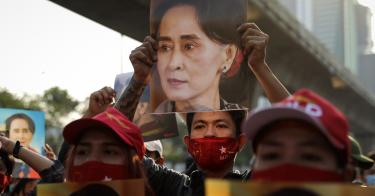The coup in Burma merits a swift response. A power-hungry military, apparently threatened by democracy, is thwarting the will of the Burmese people. In Asia, as elsewhere, the U.S. must stand on the side of freedom. To do so in Burma requires an overhaul of U.S. policy—one that is long overdue.
On February 1, the Burmese military seized power, declaring a one-year state of emergency and detaining the country’s de facto leader Aung San Suu Kyi, the duly elected President U Win Myint and other high-ranking civilian officials. When Suu Kyi assumed the role of state counsellor after a decisive National League for Democracy (NLD) victory in 2015 elections, there was broad consensus that Burma’s future was looking brighter. The complicated joint military-civilian power-sharing arrangement, however, always presented an obstacle to visions of transformational reforms.
According to the Burmese constitution, written by the military in 2008, a quarter of seats in Parliament are reserved for… the military. This allows the military to block any attempts at constitutional reform, as amendments require 75 percent of the parliamentary vote to pass.
This power-sharing arrangement makes it nearly impossible to enact broad-sweeping political changes and also limits the power of the civilian executive. Further complicating the people’s desire for democracy is the military’s control over several key government entities including the powerful Ministry of Home Affairs, Ministry of Defense, Ministry of Border Affairs, and the General Administrative Department, which is responsible for matters of sub-national governance.
>>> Burma’s Lessons for Biden—Here’s How He Should Handle Military Thugs Who Staged Coup
The Constitution also gives the commander in chief of the armed forces, Senior-General Min Aung Hlaing, the right to declare a state of national emergency and retake political power whenever deemed necessary to preserve national unity. This is the authority under which he claimed to be acting on February 1.
In addition to his newly minted coup leader credentials, Min Aung Hlaing is infamous as the military officer most directly responsible for carrying out what the United Nations calls genocide and crimes against humanity against Burma’s Muslim minority Rohingya. Min Aung Hlaing was sanctioned by the U.S. government in 2019 for his role in atrocities committed in August 2017.
This latest upheaval in Burma merits a comprehensive overhaul of U.S. policy toward Burma, something I have been calling for at The Heritage Foundation since early 2018. U.S. policy toward the Southeast Asian nation has been largely piecemeal since the Obama administration ended the state of emergency. That declaration unraveled the more sweeping sanctions regime the U.S. had against Burma.
The idea at the time was that relaxing sanctions would give Aung San Suu Kyi greater freedom to carry out reforms as Burma gradually abandoned its previously authoritarian ways. That gamble turned out to be wrong. In reality, rolling back sanctions may have given the military greater freedom to obstruct what many had assumed were Suu Kyi’s reformer visions for the country.
The Biden administration has issued strong and welcome condemnations of this weeks’ events and initiated a review of U.S. sanctions toward Burma. As the review proceeds, here are a few basic actions that can be taken.
First, the U.S. government should declare a state of emergency under the International Emergency Economic Powers Act and reinvoke JADE Act sanctions authorities to reinstitute previously rolled back sanctions targeting individuals in the Burmese military and military-owned enterprises. This does not require new legislation; the authorities to reimpose sanctions are already there.
Second, the U.S. government should consider re-sanctioning MEC and MEHL, as well as other military-owned enterprises. Treasury Department can do this by invoking various sanctions authorities including the JADE Act, Global Magnitsky, and the Specially Designated Nationals list.
Third, the U.S. government needs to reevaluate other aspects of the relationship. It should push for the release of all political prisoners, including Aung San Suu Kyi and other NLD leaders presently under house arrest. The U.S. government must also call August 2017 events what they are: genocide and crimes against humanity. The administration should also consider extending P-2 refugee status to survivors of these atrocities to send a clear message that they may find safe haven in the U.S. Finally, given the last few days events, there is also a need to evaluate humanitarian assistance and consider areas of improvement, especially in democracy-building efforts. Sanctions do not make for comprehensive policymaking, but a reevaluation of these other policy priorities perhaps will.
The coup in Burma dashed hopes that the country would be a bastion of democratic reform and freedom in Southeast Asia any time soon. There is a strong need for the Biden administration to act fast to safeguard the rights of the Burmese people.
This piece originally appeared in Forbes. https://www.forbes.com/sites/oliviaenos/2021/02/02/how-the-us-should-respond-to-the-coup-in-burma/?sh=60e5b73568cf



